“Sir, I’m aware of my shortcomings. But I’m prepared to continue this assignment in the manner you suggest…if I knew what it was about. Sir.“
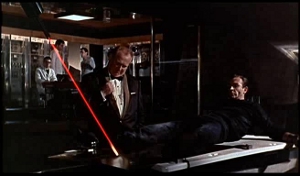
And so we come to the production model: James Bond v. 3.0 Alpha. Current series producer Michael G. Wilson has said they start off every film trying to make the next From Russia with Love (only to end up, more often than not, with “the next Thunderball“), and while there’s truth to this, Bond’s second outing isn’t nearly as influential as his third. A more accurate assessment might read, “They start out each film trying to make the next Goldfinger” because Goldfinger carved the Bond Template in stone, no matter the producer’s frequent assurances that they’ve “updated” the character for each generation.
This is the first film that starts off with a “true” pre-credit sequence: Bond in Mexico, taking care of some heroin smugglers by bombing their supply of Nitro. (Every good drug kingpin knows its best to keep the nitro within easy walking distance of the production facilities.) Back at the hotel, Bond’s girl of the night asks why he always carries a gun. Bond straight-up admits “I have a slight inferiority complex.” Only slight, James? You’re British and it’s the 60s – your country’s still recovering from WWII. Military bases the world over are either closing down or being taken over by those Ugly Americas with their machine guns. The sun’s setting on the British Empire for the first time in four hundred years, and you, Mr. Bond – a walking example of Hefnerian overcompensation – you’re talking about “slight” inferiority complexes?
If Goldfinger has a theme, I figure it’s something like, “Whose overcompensation will reign supreme?” After all, in contrast to the many Man-Mountains Bond will face in the coming decades (and faced last time in the person of Robert Shaw), tonight’s Villain began life (at least in the novel) as a short dude with a lot to prove, and a poor looser because of that. Plus, for the second time in three films, Britain’s top agent’s employed to take care of what begins and ends as an American problem.
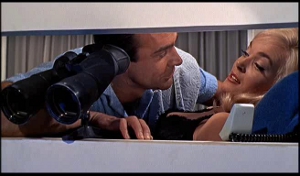
It only makes sense – this is the first film where Bond sets foot on American shores. And by “American” I of course mean “North American.” And by “North America” I of course mean, “the United States.” Well, okay – Florida, which barely counts, but we have to love them. They’re family, and at this point they were still recovering from the mad rampages of the Creature from the Black Lagoon (and those who sought to exploit him).
So after Robert Brownjohn’s credit sequence (projecting images of Dr. No and From Russia across various golden women’s parts), CIA Agent Felix Leiter (now played by Cec Linder, since Dr. No’s Jack Lord wanted more money) finds Bond by the pool and passes on his next assignment from home office: keep tabs on suspected smuggler Auric Goldfinger (Gert Frobe)…who’s right over there, playing cards. Among his many other moral failings, the man cheats at Gin, and Bond quickly discovers the hot girl with the binoculars and the portable radio Goldfinger employes to read his opponent’s cards from the balcony overhead.
Being the casual, arrogant prick we all know he is by now, Bond shames Goldfinger into loosing by sneaking into his room and making off with his card reader, Jill Masterson (Shirley Eaton). So far so good: just another Tuesday for James Bond. But, unlike the SPECTRE agents of the past, Goldfinger’s not content to drop a poisonous spider or an armed geologist into Bond’s room after he’s had a night with The Girl. No, Goldfinger sends his mute Korean manservant, Oddjob (Harold Sakata), because Oddjob can actually get shit done. Like the Jim Jones cult, he’ll take you out with one punch (or “judo chop” as it’s now known) suffocate your girl in a gold body paint, and do it all quickly and quietly enough to get away with it. This guy’s a one-man butler/mercenary army. With twenty like him, I could conquer Gotham…und then…ZHE VORLD!
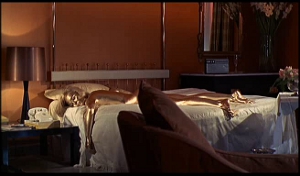
But the world, as we’ll soon learn, is not enough for James Bond. Especially since, for the first time in the series, It’s Personal. Or so M (still Bernard Lee) fears, since he goes out of his way to explain, “This isn’t personal, Double-O Seven.” No, of course not. Previous films waited until Bond’s local contact died before things really became personal. Here we are, barely twenty minutes in, and already our expectations are being upended.
This is how you make a good sequel. Instead of meeting the Villain over dinner, Bond meets (and out-cheats) Goldfinger at golf, breaking one trend by unknowingly establishing another. Tailing Goldfinger to Switzerland, Bond’s almost shot by Jill’s avenging sister, Tilly (Tania Mallet) and runs her off the road to chat her up and keep her from getting herself killed. We’re meant to read Tilly as another Honey Rider – the Wronged Woman Out For Revenge – and if this were twenty years ahead of time, we’d be right. But not so here.
And the reason, once again, comes down to Bond’s human frailty, the one aspect of this film that quickly (and quietly) fell down the series’ memory hole. Seriously, the man fucks up as often as he doesn’t. The majority of women he sleeps with die horrible deaths and (as in Dr. No) he’s repeatedly knocked out, drugged, tortured, and spends the vast majority of the last act in the Villain’s clutches. Yet this film is somehow considered less serious, less grounded in reality than the one with Kronsteen (a Batman villain in all but costume) or the one with the unshielded nuclear reactor in the middle of its own control room.
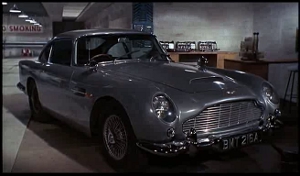
Is it because this is the film where Bond gets his famous (and still most-practical…all things being relative) Aston Martin, with its machine guns, oil slicks, smoke screens, razor hubcaps and ejector seat? (“You must be joking.” “I never joke about my work, Double-O Seven.”) Hell, a few custom mods and you could build all that in your garage. Aston Martin sold separately, of course.
Is it because Auric Goldfinger’s such an out-and-proud supervillain? Dr. No was too, but for all his atomic-age technology, No was a man (well…let’s be honest with ourselves: No was a racist stereotype) from a pre-Atomic Age, isolated in his underwater grotto. Hunted, despised, living like an animal…he made a jungle island his home and would’ve no-doubt perfected a race of atomic supermen had a certain “stupid policeman” and his even-dumber luck not come along to ruin a perfectly good party.
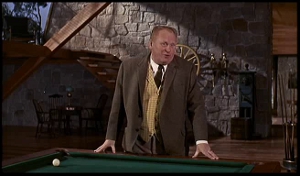
Contrast with Goldfinger, the world-traveler with the international network of industrial holdings and criminal contacts. Hell, he’s even got friends in “Red Chinese” (Bond’s term) intelligence. Sure, he also has an army of Asian henchmen in identical jumpsuits and yellow belts, but like all good villains, Goldfinger’s an aspect of the Our Hero, twisted to (even more) selfish ends. Both share a working knowledge of rarefied culture that they deploy for the purposes of concealment. Both live double lives as publicly and flamboyantly as possible. But whereas Bond is a dyed-in-the-wool cynic, snarking his way through dinner after card game after murder after bombing, Goldfinger projects a genial facade, like a crazy uncle who’s so rich he doesn’t know any better. This of course conceals his inner heartless bastard with a whole lot of shinny varnish. And for once his plan actually makes some degree of supervillain sense.
More sense than it made in the novel, certainly, where he really did just want to raid Ft. Knox, Battlefield Earth style. Ian Fleming received a mountain of “well, actually” from his fans about this. Bond even quotes the most famous calculation, so if you ever wanted to learn how many men you’d need to actually raid Ft. Knox, this is your film. Already being an international gold smuggler will help, obviously. As will being Gert Frobe. The veteran German actor gets to have real fun lording over lesser criminals, but his girth and his rolling voice can become authentically ominous…even in broad daylight, in the middle of a golf course.
I call him a supervillain with full honors and all sincerity. Whether his creators (or fans) knows it or not, the James Bond of these films is a comic book superhero who just so happened to rise from prose. (Though a comic book version of Goldfinger did run in the “Daily Express” newspaper from October, 1960 to April, 1961.) He needs villains of equal or greater severity to genuinely counter him, and thus create drama…especially if his adventures are going to continue thrilling audiences world-wide. The film seems to know this, and so instead of killing a valuable underling, Goldfinger proves he’s evil by nerve gassing a national cross section of American gangsters. In his mind, this world deserves a better class of criminal. He even says as much:
“Man has climbed Mount Everest, gone to the bottom of the ocean. He’s fired rockets at the Moon, split the atom, achieved miracles in every field of human endeavor… except crime! “

The old class may have helped give birth to this new world where miraculous crimes are possible, but they’re trapped in their old modes of thinking. They’ve refused to take that last crucial step…and Goldfinger’s just spent five minutes laying out his whole plan, so he certainly can’t let them all live. Besides, how else is he going to prove he’s evil? Kill Bond?
That’s the big flaw in Goldfinger’s whole plot. The film tries to fix this as the third act ramps up, even playing it for a little comic relief, but I just can’t help thinking it. It’s so obvious. Bond’s captured at the end of the second act, accidentally ramming his cool car into a wall while trying to avoid a reflection of his own headlights (seriously). He wakes up strapped to a table, right under an industrial “lay-zer” (as I believe it’s called) and, in desperation, tells Goldfinger MI6 knows everything and will strike him down with great vengeance and furious anger should James Bond fail to report in. This is a lie (or a great stretch, at the least) and even if it isn’t, I’m inclined to believe the opposite of whatever a spy tells me on general principal. If Goldfinger followed the same policy…then the movie would be over…which is the only reason I can find for him to believe this transparent ploy.
So Goldfinger has his personal pilot, Pussy Galore (the absolutely gorgeous Honor Blackman), fly Bond to the Kentucky ranch he owns…on top of the smuggling ring, the gold-smelting plants, and the social club back in England. (God, he’s so rich, how could you not hate him? And don’t we all want a villain we can love to hate? Even as I’m nitpicking this film, it reaches out to grab me back. Or Judo-flip me over its shoulder.) On the flight in, Bond manages to active a homing beacon Q gave him, alerting the CIA to his whereabouts. If Goldfinger’d sliced him in half back in the last scene, the CIA might never have known and Operation Grand Slam would’ve proceeded with no interruptions.
Still, I want to stress, I do appreciate the way the film utilizes all its parts to ratchet up the tension…even this plot hole. Felix Leiter and M put two and two together…but they come up with three and, instead of the full cavalry, only send two guys in a T-bird. We can see Bond stewing in his cell, surrounded by five armed guards, visibly wondering, “Where the hell are those Yank bastards?” They eventually trace Bond to Goldfinger’s ranch but, finding him strolling the grounds with Pussy Galore, figure all’s well. Just another Friday for James Bond. “I’m bushed; let’s get back to the hotel.”
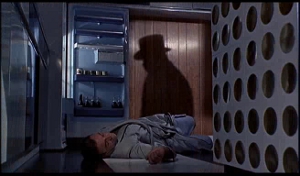
It’s great, because James Bond’s world is visibly complacent. For once, we see a real need for an incredibly lucky, unaccountable spy with supra-legal sanction to kill people. His counterparts are all old men with no instincts. Left to themselves, they’d sit in rooms and drink “rather disappointing brandy” without even knowing why they’re so disappointed. They’ve lost the lust for life that compels Bond to cheat death on a pretty-much-nightly basis. In the kingdom of dusty fuddy-duddies, the man with a libido is king. The zeitgeist of the 1960s is rising. It’s victory is at hand. It’d already taken over the movies, lock stock and gun barrel sequence.
I don’t have a problem with that, or this film. It’s my favorite of the Connery Years. By this point, he’d grown comfortable in his role, but not too comfortable…and the movie gives him more opportunity to watch stuff he likes die than the previous two combined, meaning opportunity to really act. He works well with Frobe, who again, is no slouch himself…but he really works with my favorite Bond Girl: Honor Blackman. She’s only in the last third of the film, but Pussy Galore makes a better impression than Honey Rider or Tatiana “Oh, James!” Romanova. Already famous as the leather-clad anthropologist Dr. Cathy Gale on The Avengers (and famous to me as Hera from Jason and the Argonauts…though as a true film snob, I should’ve recognized her from A Night to Remember), she treats Bond with a degree of sneering contempt I found admirable. She even has the same dream as Ian Fleming: to retire to a little island and hang up a “No Trespassing” sign. No wonder there’s such an instantaneous attraction.
So, yes, no surprise, I love Goldfinger – despite all these years and all these mountains of parodies, homages and rip-offs. I can still go back and loose myself in the details of Ken Adams’ sets. I can still see the final fight with Oddjob as a great climactic action sequence, shaming its modern equivalents even unto today. I can see how Guy Hamilton keeps the pace tight, Connery keeps the wit sharp, and writers Paul Dehn and Richard Maibaum penned a cleaner, leaner, smarter script than I think even they realized at the time. It all comes together into a neat whole that, even today, remains an above-average action extravaganza.
With that, the good parts of this Connery Era are finally over and done with. From here, we’re going down. Fast. And…if not exactly jumping the shark, we’ll certainly be shooting it. From a helicopter. Hold onto your butts.
![]()
![]()
![]()
![]()
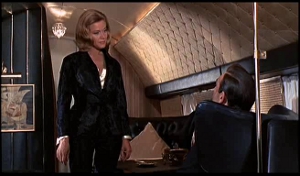

I hate to argue about the previous films when you reviewing Goldfinger but dammit, you are asking for it. First off, you’re diminishing the impact of No’s first encounter with Bond because it was built up over time. You hear his voice, see his shadow, then finally his whole body. He gradually unveils himself overtime while you learn that his empire is based on fear. That is why you have henchpeople killing themselves and standing up to torture just to avoid the wrath of Dr. No.
Now I believe Goldfinger is also a great villain because he’s the master of a precious metal that seduces everyone: Even Bond at one brief point when he sees that lovely bar of gold when he had dinner at Colonel Smithers’. Also, what works in GF’s favor is that the film feels like it’s bathed in gold. All the key Bond girls are blondes and the Asians provide the unfortunate stereotype of having “yellow skin”. However, Goldfinger isn’t quite as interesting as Kronsteen, No, and Klebb because you know they all felt like the freaks of society at one point or another in their lives and they obtained power in a far less conventional way, all of them probably never doing a moral or legal act in their life to get where they were. Arguably Goldfinger has done many blue collar crimes to create his fortune but it’s just not as romantic as being a planner of a vast criminal organization or a spy-killing agency. On a similar subject, Fleming did split the difference once with Hugo Drax. He had the “Goldfinger” money and respect but had the freak qualities of Mr. Big or Doctor Julius No.
However, getting back on topic, I feel that Goldfinger is one the great Bond films but only the first half. There was clearly a rhythm going on with the nature of the film with a serious moment then a comic one afterwards. When the film gets to Kentucky, the rhythm is lost completely. For example, even with the knowledge of Bond being forced to play that charade of being on top of things while having a mint julep with Auric, there was zero tension in that scene because Bond shows absolutely no disgust at Goldfinger’s threat and you don’t feel that Bond may be killed instantly if he tried to escape at that moment. Again, going back to Dr. No, look how Bond tries and fails to have a psychological war with No. He keeps tries to convince No his plans are shot by bluffing him and insulting the doctor so he would loose his temper and do something stupid. The icing on the cake was the “clumsy effort” to stop the guards from taking Honey because he remembers her talking about being raped. To see Bond that helpless then beaten to shit moments later reveals a ton of humanity about the character. That guy in the tux winning big at the casino at three am was broken down to a helpless child. I once read a review stating that Doctor No was a “psychological journey” and couldn’t agree with that label more.
All good points…but do we really want to talk about wild tonal shifts? How many other Jamaican pulp noir spy-fi thrillers end with a fist fight between the main character and a mad scientist with metal hands atop the nuclear reactor powering the latter’s underground base…? Okay, you could probably fill whole Barnes & Nobles with them at this point, but do you see what I mean? From Russia with Love is an even better example, since it starts off as “Dr. No in Turkey,” becomes Murder on the Orient Express and then predicts the future of Action movies by ripping-off Hitchcock and blowing a lot of shit up, but good.
That said, I love all three of these films to one degree or another, and I hope I’ve made that perfectly clear. I just happen to love Goldfinger the most, even with all it’s various flaws. Flaws like
-Tilly notices the two flat tires, but nobody comments on the GIANT FUCKING GASH in the side of her sweet ride.
-There’s nowhere near enough blood anywhere in all this, despite the clear demonstration of the power of OddJob’s hat…and his throwing arm…never mind all the automatic weapon’s fire in the third act…
-Goldfinger allows one gangster to leave…the room where he planned to gas everyone anyway…only to kill the gangster he allowed to leave a completely different way because…yeah, the entire side-trip to the junk yard is essentially padding, despite the little bit of tension it adds with Felix and Not-Felix following along in their T-bird
-Bond’s “seduction” of Pussy is pretty rapey. “Stop” means “stop,” even when a villain says it. But I’ll save that rant for a review where I can actually showcase it.
And those are just the obvious ones I couldn’t find a place for in the review-proper.
Really, it all comes down to personal taste, especially when it comes to the humor in the third act. And while I recognize Dr. No’s significance, I can’t deny that I have more fun with Goldfinger any day. No disrespect to Terrance Young, but I much prefer Guy Hamilton – at least at this point in the two men’s careers – and had no trouble dealing with the tone shift. Then again, this is James Bond we’re talking about, so I almost never do. Like the death of someone close to him, I’ve pretty much grown to expect that.
The thing is, I really don’t think the tone shifts in Dr.No. With M’s speech at the beginning about “toppling” and the mystery villain who seems more like a phantom or boogieman of Jamaica, you know this is film will probably end up in an extraordinary place. Another thing is, Bond always felt alert and ready to defend himself but he indulged in the danger and the sex; for example, getting in the car with the phony driver from government house and screwing Miss Taro. Bond never got too comfortable even when he was eating and drinking at No’s bizarre hotel prison. The key problem with Goldfinger is not where it ends up but things just become far too casual. Bond doesn’t seem like a deadly spy when the film ends up in Kentucky, you feel like he’s on vacation with Goldfinger despite what is actually occurring. However as you said, it is really up to personal taste. I still love Goldfinger despite any flaws it has as well as Dr.No, From Russia with Love, and On Her Majesty’s Secret Service.
Also, I would count Goldfinger as the few times they really put Bond in genuine danger. The sequence with Bond escaping a laser castration was great because all he used was his words and was notably panicked.
There’s a very good reason it’s been parodied to death…though I don’t want to get to Freudian with this franchise quite yet. Plenty of time for that during the not-so-swinging-70s.
That was one those few times Richard Maibaum one-upped Fleming. In the novel, Bond was going to loose his two best friends to a table saw and Goldfinger wanted to know who he was working for. Here, it’s better because Goldfinger already has what he wants to know so he just leaves Bond to die.
Hi David. This was a very good review of not only Goldfinger but several other James Bond films you referenced within it. For me, Goldfinger is easily one of the top 3 Bond Films, and only kept from the top spot by some of the dated elements within it, “that’s just as bad as listening to the Beatles without ear muffs!” for instance.
Auric Goldfinger is phenomenal as a Bond villain. He’s brilliant, arrogant, dangerous and mysterious, like you said about his dual personality. He also employs the best henchmen/women in his tactical force. OddJob is, hands down the best assassin in Bond history who gets the job done, like you said. He’s also completely loyal to his boss. Let’s face it. He’s willing to die at ground zero of an atomic explosion to prevent James Bond from stopping the bomb. Pussy Galore is also strong and capable. Obviously her loyalty is questionable in the light of Bond successfully seducing her into changing sides, but up till that point, she gets the job done, as well.
Goldfinger’s plan to knock off Fort Knox is quite ingenious-particularly compared to the Flemming novel plot. The plan to irradiate the US supply of gold to increase the value of his gold is simply brilliant. This elevates him above most of the rest of the Bond villains for great criminal planning.
And Sean Connery is definitely in his prime for James Bond in this film.
I really enjoyed your article, my friend. Keep up the great work. Peace.
Thanks, Les. At this point, I can barely remember how it was to be this enthusiastic about James Bond movie, but Goldfinger wound up being the second-highest one in my ratings archive by virtue of everything you mentioned…and enough else to support fifty years of careful attention. (To say nothing of all the “homages”).
Oh, without question. My first James Bond was Roger Moore in the film Moonraker. It took me a long time to first appreciate and then love Sean Connery as Bond, and this was the film that finally opened up my eyes to just how great he was in the role. I think, ultimately, I’m liking Daniel Craig’s portrayal the best, as Bond the way I’d imagined him when reading the Flemming novels, my friend. Peace.
Having grown up in a house of Sean Connery fans, my appreciation of him was practically genetic, but my folks were fans of a particular strata of Connery. They were on the bleeding edge of that wave that eventually declared everything from Wind and the Lion to Hunt for Red October the Designated Height of Sir Sean’s career, so I wound up coming to these classic Bond flicks as a teenager, during the Brosnan Age, when they seemed a welcome breath of fresh air from a bygone age (and the key to all the Austin Powers films). Oddly enough, despite having fallen off the Bond train in the early-70s, my folks wound up liking Craig as much as you, me, and everyone who isn’t overly fussy about their fictional secret agent’s range of facial expressions.